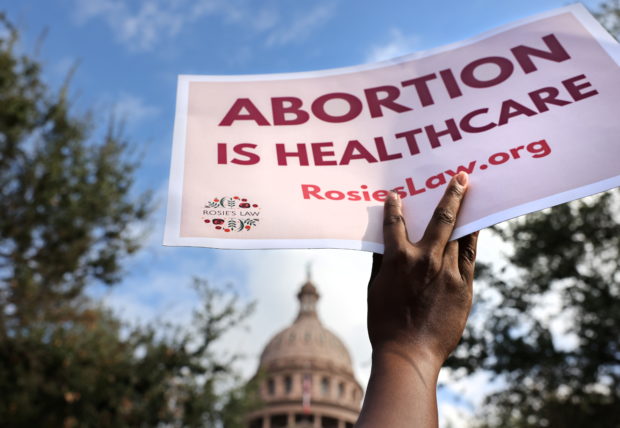Biden administration asks US Supreme Court to block Texas abortion law

A supporter of reproductive rights holds a sign outside the Texas State Capitol building during the nationwide Women’s March, held after Texas rolled out a near-total ban on abortion procedures and access to abortion-inducing medications, in Austin, Texas, U.S. October 2, 2021. REUTERS FILE PHOTO
WASHINGTON — President Joe Biden’s administration on Monday asked the U.S. Supreme Court to block a Texas law that imposes a near-total ban on abortion, calling the Republican-backed measure plainly unconstitutional and specifically designed to evade judicial scrutiny.
The administration asked the Supreme Court to quickly reverse a decision this month by the New Orleans-based 5th U.S. Circuit Court of Appeals to lift a judge’s order blocking the law while litigation over the statute’s legality continues. The justices in a 5-4 Sept. 1 decision let the law take effect in a separate challenge brought by abortion providers in the state.
The Texas measure, one of a series of restrictive abortion laws passed at the state level in recent years, bans the procedure after about six weeks of pregnancy, a point when many women do not yet realize they are pregnant.
The Justice Department, which filed suit last month in a bid to stop the law, told the Supreme Court in a filing that the 5th Circuit’s action enables the ongoing violation by the state of Texas “of this court’s precedents and its citizens’ constitutional rights.”
“Texas’s insistence that no party can bring a suit challenging S.B. 8 amounts to an assertion that the federal courts are powerless to halt the state’s ongoing nullification of federal law. That proposition is as breathtaking as it is dangerous,” the Justice Department added, using the formal name of the Texas law.
The filing also said that the Supreme Court could decide to take up and hear arguments in the case even before lower courts have issued their own final rulings “given the importance and urgency of the issues” involved.
The Supreme Court signaled that it will consider resolving the dispute quickly. In addition to asking Texas officials for a response to the Justice Department’s request by midday on Thursday, the justices also fast-tracked their consideration of whether to immediately take up a separate challenge to the law by abortion providers in the state.
The Texas measure makes an exception for a documented medical emergency but not for cases of rape or incest. It also gives private citizens the power to enforce it by enabling them to sue anyone who performs or assists a woman in getting an abortion after cardiac activity is detected in the fetus. That feature has helped shield the law from being immediately blocked by making it more difficult to directly sue the state.
Under the law, individual citizens can be awarded a minimum of $10,000 for bringing successful lawsuits. Critics have said this provision lets people act as anti-abortion bounty hunters, a characterization its proponents reject.
The Biden administration’s lawsuit argued that the law impedes women from exercising their constitutional right to terminate a pregnancy as recognized in the Supreme Court’s landmark 1973 Roe v. Wade ruling that legalized abortion nationwide. It also argued that the law improperly interferes with the operations of the federal government to provide abortion-related services.
In his Oct. 6 ruling blocking the law, U.S. Judge Robert Pitman found that the measure was likely unconstitutional and designed to avoid judicial scrutiny. Pitman said he would “not sanction one more day of this offensive deprivation of such an important right.”
The Supreme Court has a 6-3 conservative majority. When the Supreme Court allowed the law to take effect, conservative Chief Justice John Roberts dissented along with the three liberal justices, expressing skepticism about how the measure is enforced.
Roberts said he would have blocked the law’s enforcement at that point “so that the courts may consider whether a state can avoid responsibility for its laws in such a manner.”
The Supreme Court already is set to consider a major abortion case on Dec. 1 in a dispute centering on Mississippi’s law banning abortions starting at 15 weeks of pregnancy, Mississippi has asked the justices to overturn Roe v. Wade. A ruling in the Mississippi case is due by the end of next June.














